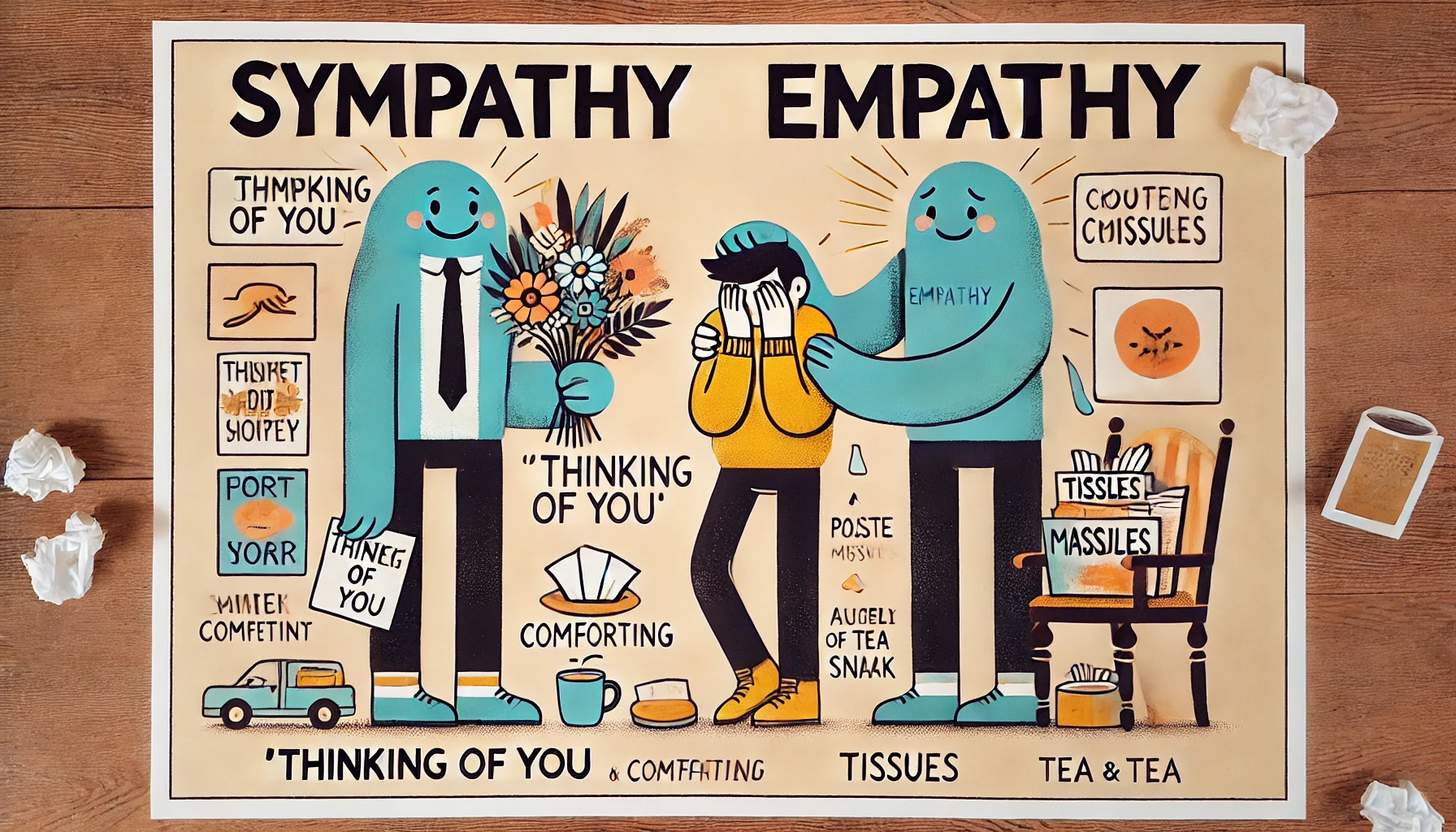Have you ever noticed how relationships are like houseplants? Neglect them, and they wither. Forget to water them with understanding and care, and soon you’re left with something that belongs in the compost. When people focus solely on their own interests, relationships don’t just suffer – they wither, leaving you wondering where it went wrong.
In our daily lives, we’re constantly bumping into human emotions like a roulette wheel in life’s great game. Someone’s having a terrible day, another person’s celebrating a win, and there we are, trying to figure out whether to offer a tissue or a high-five. This is where sympathy and empathy come into play – they’re like the dynamic duo of emotional intelligence, though one wears a slightly fancier hat than the other.
Think of sympathy and empathy as emotional response levels. Sympathy is like sending a “Thinking of You” card – it’s nice, it’s thoughtful, but it stays safely on the threshold of feeling. It’s when we say, “Oh, that must be tough”, while secretly thinking ‘this one’s not up my alley.”
Empathy, however, is like putting on someone else’s emotional shoes and actually walking a mile in them (on stones and gravel). It’s the difference between saying “I see you’re sad” and thinking “Your sadness is making my own heart swell with sorrow.”
Let’s break empathy down into two types:
- Understanding what someone else thinks or feels. It’s like being an emotional detective, minus the recording device and hidden camera phone.
- Actually feeling what they’re feeling. Think of it as emotional WiFi – you’re picking up their signal loud and clear.
A few situational examples:

Serious Ailments Sympathy says: “That’s terrible! Let me know if you need anything!” (While making no actual plans to do anything.) Empathy does: Shows up with small eats, sits in uncomfortable hospital chairs, and says, “I brought your favorite trashy magazines and I’m ready to be with you for as long as you need.”
Demise of a Spouse or Child – Sympathy sends: Flowers and a card with generic condolences. Empathy brings: Time, presence, and sometimes just sits in silence because they understand that some pains are too deep for words. They’re the friend who remembers to check in not just at the funeral, but three months later when everyone else has gone back to their regular lives.
Loss of Job Sympathy texts: “That’s rough, pal, I am sure you will find something better!” Empathy arrives with: An updated LinkedIn profile, coffee, copies of your latest C V and possibly a shoulder to cry on or a punching bag to hit (emotional choices vary). They might say, “This totally stinks, and I’m here to help you navigate through this career plot twist.”
Financial Loss in Business – Sympathy offers: “Oh no! That’s terrible!” Empathy provides: “I hear ordering dosas and creating a recovery battle plan is a time-honored tradition in times like these. Shall we?”
Loss of Money to Scams – Sympathy whispers: “How unfortunate!” Empathy declares: “Listen, if Nigerian princes were really giving away that much money, we’d all be living in solid gold houses. Let’s figure this out together – no judgment, just solutions.”
Motor or House Accidents – Sympathy sends: “Hope your insurance covers it!” Empathy shows up with: An alternate plan, a reliable mechanic’s number, or even better – actual help with the insurance paperwork (because let’s face it, insurance claims are where joy goes to die).
Haven’t we experienced some or all of the above?
When God closes a door, he opens a window. That’s empathy.
Growing older shouldn’t mean growing lonelier
Working with seniors requires the emotional intelligence of a therapist combined with the patience of someone waiting for the Tamil serial to end. It’s not just about helping with physical needs – it’s about understanding that every senior has a much younger person trapped in a body that’s decided to retire without their permission.
When a senior loses their independence, sympathy might say, “That must be hard.” Empathy understands that losing the ability to drive isn’t just about transportation – it’s about losing a piece of freedom that’s been part of their life since they first convinced their parents they wouldn’t crash the family car.
Be an inspiration, not an emotional sponge
Being empathetic doesn’t mean you need to become an emotional vacuum cleaner, sucking up everyone’s feelings until you’re full of other people’s waste bins. It’s about finding the sweet spot between caring deeply and maintaining your own emotional health. Think of it as being a good emotional neighbour – there when needed, but with healthy boundaries and your own life to live. “Sometimes I need to take care of myself too.”
Both caring and sparing

In the end, both sympathy and empathy have their place in our emotional toolkit, like hammers and screwdrivers in our ability to connect with others. Sympathy is the quick-fix hammer – useful, but sometimes a bit blunt. Empathy is more like a full set of precision tools, allowing us to carefully unlock the deeper connections that make life richer and more meaningful.
Remember, in a world where you can be anything, be someone who genuinely cares. And if you can’t be that, at least be someone who brings snacks – because whether you’re offering sympathy or empathy, everything’s better with cookies.
Human connection is so important, and sometimes a touch of warmth and humour can help these deep messages resonate even more strongly with us.
Help is always a doorstep away.
Written By
V. Krishnan
Extension 13
Covai S3 Retirement Community

